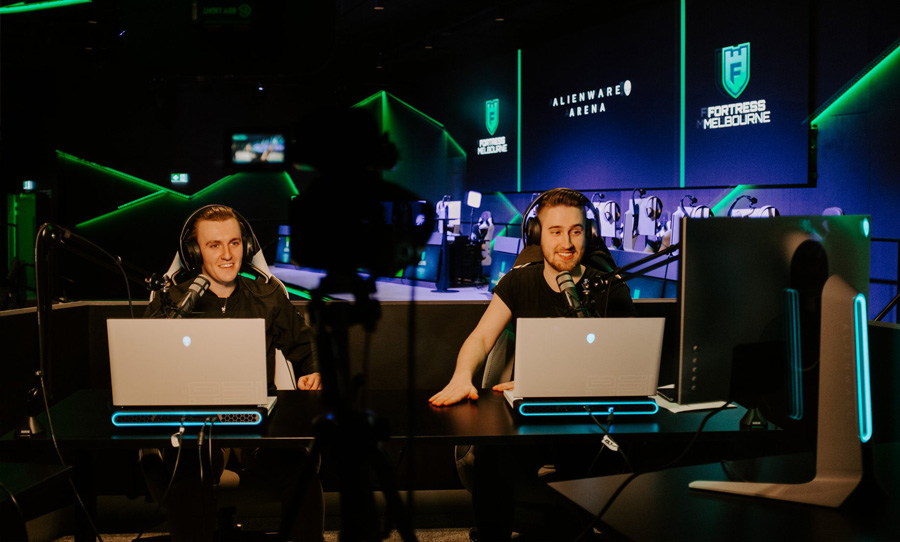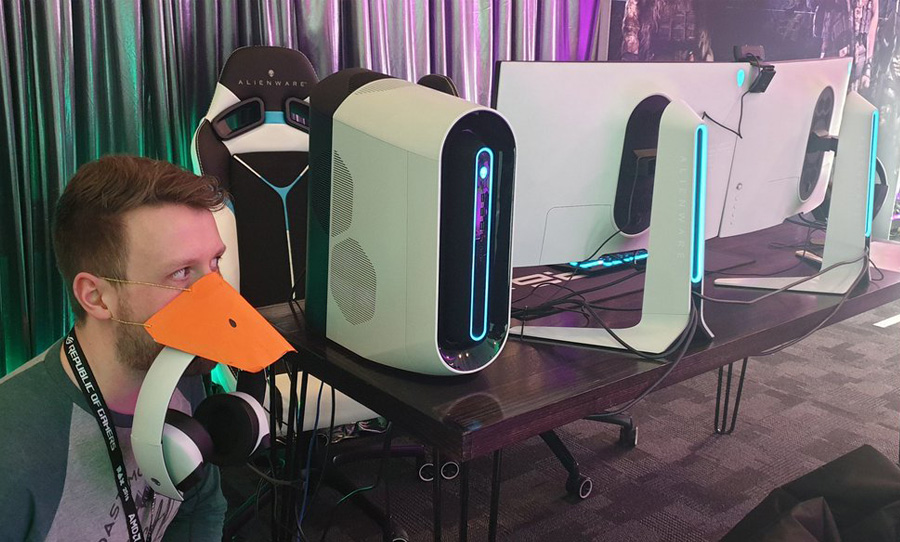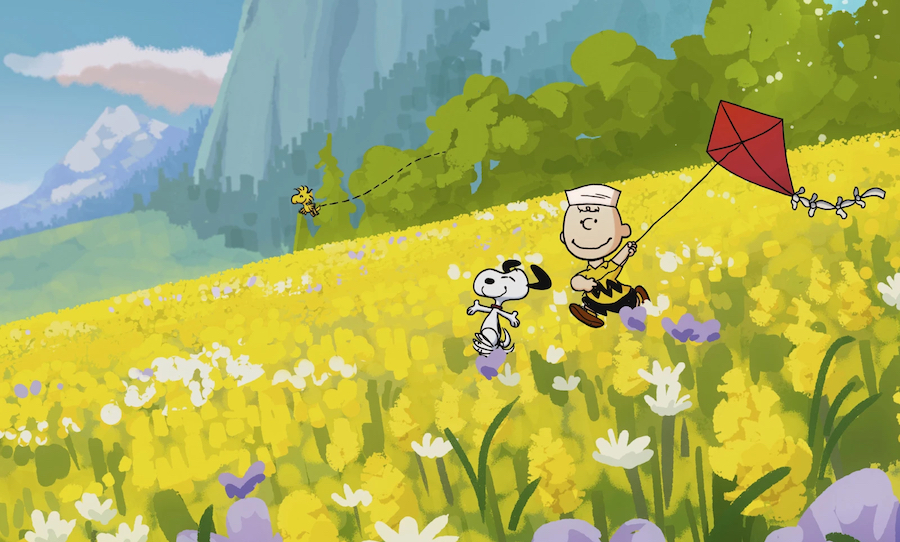In 2020 it’s impossible to mention the gaming industry without speaking about streaming. User-generated, long-form content accounts for a huge share of public consumption, with gamers everywhere holding their favourite streamers in the same regard as movie stars or world-class musicians.
When the popularity of any medium becomes pervasive across all of pop culture, shifts are bound to happen. 20 years ago, no media whiz would have expected gaming celebrities to become the most sought-after stars in the world, but what do you know? Right now PewDiePie is being Googled more than Brad Pitt.
So what lies ahead for streaming, the new mass media? How does it grow beyond its contemporary critical size, and what fed the beast which it has become? We spoke to a few key players for some insight.

How has streaming changed over the last decade, and where will it go from here? We speak to Rudeism and Alienware’s Brianna Sonter for the scoop.
Rudeism is a popular Twitch streamer who operates on the claim he “can turn anything into a controller”. Leveraging game development and electronics know-how, he’s played Overwatch with bananas and Star Wars Jedi: Fallen Order with a home-made lightsaber, to name a few more popular endeavours. His streams are amongst the most wildly innovative out there.
Asked to reflect on how the medium has changed over the last five years or so, he highlighted a few ways streaming – and streamers – have been finding avenues for content beyond gaming.
“The single biggest change now is that streamers aren’t just gamers. When Twitch was Justin.tv, there was certainly the option to stream content other than gaming, but when the site really took off it was clear that gaming was the driving engine behind it, so Twitch went all-in on that. Makes sense – but at a certain point, it also makes sense to open up the possibility for those that want to bring other kinds of content to the table.”
“Following this, we started seeing streamers going out-and-about, streamers just chatting with their community, streamers creating art, baking, building inventions (this guy!) and even more. I remember when the IRL category was first announced and the amount of backlash it had from the more hardcore crowd, but there’s no denying that it’s really engaging stuff. I think we’ve seen the effect of those kinds of streams rippling out to the rest of Twitch, and in a really positive way. Variety’s good!”
In the same vein, celebrities outside of the gaming zeitgeist are turning to games and streaming as a way to interact with their fans more directly – a type of engagement that thrives on Twitch or similar platforms. Jack Black has a Youtube channel and so does Brie Larson, Grimes casually announced her latest album while playing Bloodborne, and the internet melted when Henry Cavill pieced together a gaming PC with his big, strong hands.
“I think streaming is the best way to get up close and personal with people on a global scale, both as a viewer and as a broadcaster”, Rudeism shared.
“That proximity is something you don’t get through any other medium, which is why most people are drawn to it for entertainment, both to consume and create. Streaming feels like a natural space to expand into if you’re already well-known from another field, especially now that we’re in a time where there’s an audience out there for any kind of streamed content, not just gaming. I believe we’ll see a lot more celebrities expand into Twitch and YouTube as time goes on – it’ll be interesting to see their impact on those platforms as they bring more attention and money towards them.”

When gamers become superstars and superstars become gamers, attitudes shift. A 2018 State of Gaming survey issued by Dell did a lot of work in terms of reinforcing these new ideas about gamers, iterating the fact that contemporary gamers were well-rounded individuals who also love music (63%), reading and writing (42%), watching sports (39%), and working out (33%). Moreover, they believe the word ‘gamer’ doesn’t carry any negative connotations.
For Rudeism, streaming and gaming have also come to light as completely viable career options in the public eye.
“I’ve been streaming for five years now, which doesn’t feel like a huge amount of time for public opinion to shift so much. That said though, the fact that gaming has been receiving a lot more coverage in more traditional mainstream media, especially with the rise of esports, is showing a lot of non-gamers just how big the industry is, and how viable it is as a career choice, either in streaming, esports, [or] game development.”
“I’ve been a part of all three of those, and it’s been interesting seeing the change in opinion that some of my family members have had about what used to be my hobby, but has turned into my career.”
As streaming – and gaming in general – becomes more and more massive, a logical progression has meant getting out of the home and into the real world. World-scale events with massive audiences such the Dota 2 International have paved the way for other experiences; Esports bars, gaming venues, co-work spaces for streamers, athlete houses, and much more.
Brianna Sonter is an Alienware team member and streamer who operates out of Australia’s only Eports venue, bar, and gaming hub; Fortress in Melbourne. “Fortress is a true home for gamers with everything from a gaming arena, LAN café and stream pods to eSport training rooms and a Dungeons and Dragons (D&D) themed tavern”, Brianna shares.
“Alienware is the venue’s hardware partner and we’ve kitted the place out with over 150 Aurora desktops and peripherals in the free gaming area, the esports arena and custom streaming pods so everyone has a chance to get in on the action.”
Rather frustratingly the venue opened its doors on Friday March 13th this year, but after a massive launch event, coronavirus restrictions forced them into temporary closure just five days later. Brianna is still in high spirits though, as it’s allowed the venue team and Alienware’s Australian contingent to focus on what we’ve been talking about for 1000 words; streaming and other avenues for online content such as a $70,000 Valorant tournament.
“Fortress has closed up as a safety precaution. The local Alienware team are supporting the venue’s online activities including esports tournaments, competitions and streaming sessions. At the moment, we’re working with Fortress as a team to plan what comes next, but when the doors are open again, you’ll find me helping people build their dream Alienware PC!”
While Fortress is unique in Australia, many smaller social spaces exist for gamers’ LAN café, tabletop, and arcade needs – plus a few more unique offerings such as distinctly retro bars or themed arcades. Brianna thinks that going forward, these venues will only pop up more and more.
“When Fortress was created, the idea was that it wouldn’t just be a place where people could go and game for a few hours and that was it, it really was designed to be an alternative to going to a bar or a café to connect with friends and likeminded people. It’s more than just a gaming hub, it’s a home for all gamers which we believe will resonate.”
“I think these places will be a key element in helping to build and amplify the love of gaming! Not only will Fortress create a space that will give the Australian gaming community a place to come together, both in person and online as has been the case recently, but it will change the face of what gaming looks like in this country.”
“We know from the IGEA’s 2019 State of Gaming report that two out of three people play video games, and 47% of that community is women, so that old perception has already changed in reality. Venues like Fortress will create a communal space where anyone with an interest in gaming, as well those who are game-curious, can be exposed to gaming in all its forms and develop their skills and ultimately their passion. This will naturally help gaming to become even more inclusive and all of us at Alienware are excited to be a part of this change.”
Streaming does have room to grow online – there’s always room to grow your channels online – but a more meaningful integration into IRL spaces is, to many, the most exciting development for gaming to come. Imagine a pub where, alongside the Premier League and UFC, the current Counter-Strike or League of Legends tournament is playing on a widescreen TV. Gaming conventions such as PAX Melbourne already attract crowds to rival the city’s largest conventional sporting events.
On a smaller to mid-level though, for ground-level streamers or larger games venues like Fortress, harnessing technological advancements in the space will be a key driving force of this change. The aim of the game, at least for Brianna and Alienware, will be accessibility and immersion.
“Alienware’s mission, and passion, is to bring games the best in class hardware to give them the biggest edge in their game play. Our recent new releases really highlight this with new m15 and m17 R3 gaming laptops which are thinner and lighter than ever before to enable gamers to get mobile, and never miss a stream, or raid no matter where they are.”
And for Rudeism, any new tech is an opportunity for weird and wonderful new ideas, especially where end-user interactivity becomes more enjoyable.
“Faster internet speeds and faster PCs will no doubt result in higher resolution, higher-frame streams, but interactivity is the name of the game, above all else. There’s already been a ton of examples of games where viewers can impact gameplay, both directly and indirectly.”
“Personally, I’ve been working on a device that lets my Twitch chat alter my keyboard and mouse while I’m playing games – swapping keys around, making them malfunction, inverting my mouse, all sorts of fun stuff! But that’s the tip of the iceberg – most instances of this have all been done via text chat. We’re starting to see interactivity that goes beyond text – Twitch Extensions are a good example – but I’d like to see even more direct ways of interacting with streamers. I’m working on some ideas!”
Voice-activated honking. Motion-controlled flaps. Moving by waddling your feeties. 🦢
THIS is how Untitled Goose Game is meant to be played.
🔊 Sound on! 🔊https://t.co/zYmwx36Hkq pic.twitter.com/DJLigMw64J
— Rudeism (@rudeism) October 2, 2019
With creators and industry like Rude or Brianna at the helm, there’s no doubt that streaming will only continue in its meteoric rise to the mainstream; a leading content hub for the world’s newest and most rapidly evolving sports and entertainment industry.
Whether the next step for streaming is to heavily push into IRL spaces like pubs and sporting venues, or finding new and innovative ways to cater to a massive and growing home viewership, there’s no doubt that gaming will only become a more intrinsic part of our everyday lives.
Find out more about Rudeism on Twitch and Fortress Melbourne on their website.



